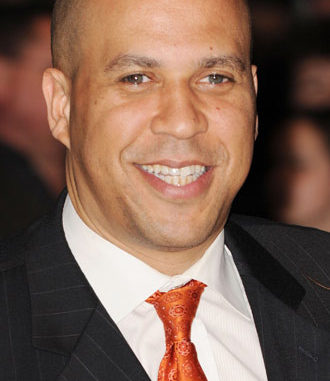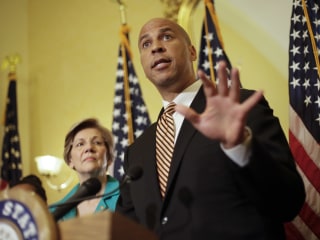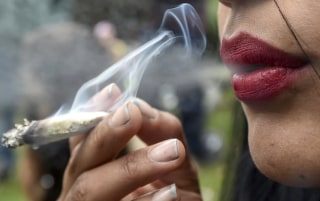
/cdn.vox-cdn.com/uploads/chorus_image/image/55992527/653545584.0.jpg)
by Daniel Arkin (NBC)
Sen. Cory Booker introduced a wide-reaching bill on Tuesday that would drop the federal prohibition on marijuana and even encourage states to legalize the drug.
In an announcement on Facebook Live, Booker, D-N.J., ran through the reasons why he believes the war on drugs has failed: families torn apart; billions in taxpayer dollars wasted; too many Americans behind bars — especially people of color and the poor.
Legalizing marijuana, he said, would go a long way to solving those national problems.
But there’s another potential side effect to the Marijuana Justice Act — one that Booker says had not been on his mind when he started working on it: Legal pot, according to some researchers and advocates, could help blunt the opioid epidemic.

The bill comes as the Trump administration, particularly Attorney General Jeff Sessions, vows to get tough on marijuana.
Sessions, a fierce opponent of legal pot, has scoffed at the idea that weed could be used as a weapon against opioid addiction. “Give me a break,” Sessions saidduring a speech in February, later adding: “Maybe science will prove I’m wrong.”
A recent study found that in states where it is legal to use medical marijuana for chronic pain, hospitals ended up treating far fewer opioid users.
Hospitalization rates for opioid painkiller dependence and abuse fell 23 percent on average in states where pot was allowed for medicinal purposes, according to the study published earlier this year in Drug and Alcohol Dependence. And hospitalization rates for opioid overdoses dropped 13 percent on average, the study found.
In a 2014 study published in JAMA Internal Medicine, researchers found the annual number of deaths from prescription drug overdose is 25 percent lower in states where medical marijuana is legal.
“It’s a super intriguing idea,” said Dr. Esther Choo, a professor of emergency medicine at Oregon Health and Science University who studies substance abuse. “I think it totally makes sense.”
Choo, who was not involved in either of the studies, cautioned that doctors and scientists need to keep studying the potential health hazards of marijuana.
The cannabis industry operates in an unusual legal gray area. Eight states have legalized the drug even though the Drug Enforcement Administration classifies it as a Schedule I substance — meaning it’s considered more dangerous than cocaine (Schedule II) or ketamine (Schedule III), the oft-abused pet tranquilizer. Booker’s bill would remove pot from the Schedule 1 category.
At one rehab center in California, drug treatment specialists have reported seeing some opioid addicts make incredible strides with marijuana.
“We know anecdotally, but with a lot of confidence, that it helps people with detox and it helps people stay off opiates,” said Joe Shrank, the co-founder of High Sobriety, a Los Angeles treatment clinic where pot smoking is not only tolerated but encouraged.
For many of the facility’s patients, marijuana is an “exit drug.”
“If we’re dropping almost 100 bodies a day [due to the opioid crisis], we should be looking at all options,” Shrank said. “If there are people who want to use cannabis to get off and stay off opioids … I’m, like, good with that. You’re not gonna drop dead. You’re gonna have chances in life.”
Many medical professionals, however, remain extremely skeptical of marijuana’s usefulness when it comes to treating opioid addicts.
“I have never seen it,” said Dr. Libby Stuyt, the medical director of a 90-day inpatient treatment program at the Colorado Mental Health Institute.

In an interview with NBC News’ Ronan Farrow in May, former President Barack Obama’s onetime deputy drug czar suggested marijuana was not a suitable treatment for opioid dependency, saying he fears addicts will use both substances simultaneously.
“It would be a supplement,” said A. Thomas McLellan, the former deputy director of the Office of National Drug Control Policy.
Earlier this year, a National Academies report found evidence that cannabis can successfully treat chronic pain, as well as chemotherapy-induced nausea and plasticity. The report, based on a survey of more than 10,000 scientific abstracts, did not find evidence of overdose deaths linked to cannabis.
Meanwhile, Booker’s bill faces an uphill and very likely insurmountable climb on Capitol Hill.
That despite a majority of the American people — 60 percent, according to a Gallup survey from October — saying they support legal marijuana across the land.


Be the first to comment